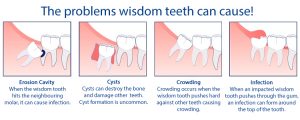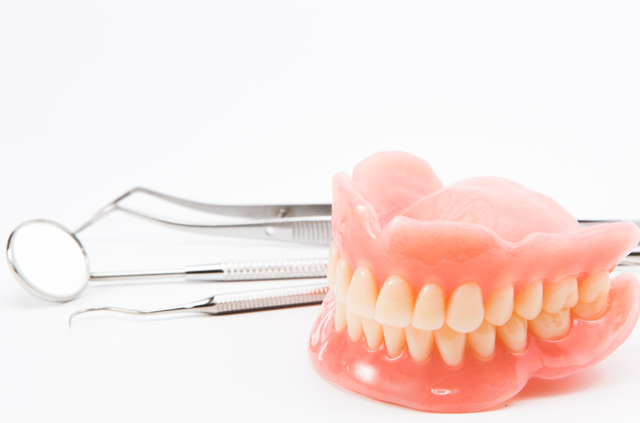As we want you to avoid Wisdom teeth extractions in the future, here is some advice to take care of them.
Wisdom teeth (or third molars) are the last set of teeth that come through on each side of the upper and lower jaws. There are usually four wisdom teeth. They emerge during the late teens or twenties.
Sometimes, there is insufficient space for the wisdom teeth to come out into their normal position. This means that they may only come through partially (partial eruption) or not emerge at all (impacted). When this happens, your wisdom tooth may be painful.
What causes wisdom teeth pain?
Having impacted or partially erupted wisdom teeth may cause no problems at all. Commonly, however, impaction can make effective oral hygiene around the area very difficult leading to the build-up of food and bacteria. This can lead to several complications:
• Pain and discomfort
• Decay of the wisdom tooth
• An incorrectly angled wisdom tooth promotes food packing leading to deterioration of the molar in front of the wisdom tooth
• Gum inflammation and soreness (pericoronitis)
Pericoronitis
A part of your gum line naturally breaches when a wisdom tooth finally breaks through the skin, but often just partially because it doesn’t have enough room to grow. Food particles can then become trapped by that flap of tissue, resulting in an infection in the gum surrounding the wisdom tooth. This is known as pericoronitis. It has the following symptoms:
• Painful or swollen gum tissue around the wisdom tooth.
• A foul smell or taste in your mouth
• Fever or frequent chills
• Swollen lymph nodes
• Spasms in the jaw muscles (trismus)
Consult your dentist if you experience any or all of the above.
Treatment
Once pericoronitis has been diagnosed, there are three main possibilities: The entire tooth emerges naturally, and the infection will resolve itself, the gum flap is removed, or the tooth itself is extracted. Your dentist will clean the area around and under the gum to remove food particles and show you how to do the same. He or she will also be able to determine if removing the wisdom tooth is the best (or only) course of action.
Treatment options for impacted Wisdom Teeth
Impacted teeth require no treatment if they are healthy and are causing no problems.
Simple local measures can sometimes be the only required treatment. These include improved oral hygiene and the use of antiseptic mouthwash.
Some impacted teeth will need removal. However, wisdom teeth extractions are not without risk. Their removal is, therefore, only recommended if advised by your dentist.
Treating wisdom teeth pain at home
Impacted wisdom teeth may cause pain, aches, and tenderness. Ultimately, wisdom teeth extractions can help resolve these problems. In the meantime, there are several over-the-counter medical treatments and natural home remedies available to help you avoid wisdom teeth extractions.
1. Numbing gel
A numbing dental gel may help reduce feeling in the gums and dull the pain. These gels are available over the counter and contain the active ingredient benzocaine.
Most dental gels can be applied directly to the affected gums throughout the day. However, it is essential for a person to follow the instructions included in the product. Also, it is possible to be allergic to benzocaine.
2. Ibuprofen
Ibuprofen is an over-the-counter pain relief medication that helps reduce inflammation. Taking the recommended dose on the packet may help relieve discomfort. It can also reduce inflammation of the gums associated with wisdom teeth development.
3. Ice pack
Applying an ice pack to the jaw can help reduce inflammation, which in turn may relieve pain. Using ice can also have a numbing effect. A person can try holding an ice pack with a tea towel around it against their jaw for up to 15 minutes. The ice pack can be applied off and on with 15-minute breaks until the pain has subsided.
4. Salt water rinse
Salt water has natural disinfectant properties. Rinsing the mouth with salt water several times a day may help to reduce symptoms such as pain. To make the salt-water rinse, a person can dissolve one or two tablespoons of salt into a glass of freshly boiled water. When the water has cooled slightly, it can be swirled around the mouth for several minutes, and then spat out. This can be done two or three times a day, or until the pain starts to reduce.
5. Cloves
A 2006 study showed that the numbing effect of cloves could help with the pain of wisdom teeth. To try this home remedy, a person can use a whole clove or clove oil.
If using a whole clove they should:
• Place the clove over the wisdom tooth that is causing pain
• Hold it in place by closing their jaw, but without chewing
• Leave it there until the pain reduces and then spit it out
To try this remedy using clove oil, a person can:
• Put a few drops of clove oil on a ball of cotton wool
• Put the cotton wool on the wisdom tooth that is causing pain
• Hold the cotton wool in place until the pain reduces and then remove it.
6. Onion
A 2007 study found that onions have anti-inflammatory and antimicrobial properties. These advantages of onions mean they can help reduce swelling and fight bacterial infections.
To use onions as a home remedy, a person should:
• Cut off a piece of onion
• Chew the onion on the side of the mouth that has the pain
• Keep chewing for a few minutes until pain reduces and then spit out the onion
This process allows the juice from the onion to go into the gum so that it can reduce inflammation and bacteria.
7. Tea bags
Tea bags should only be placed in the mouth when completely cooled.
A 2016 study found that tannins contained in tea bags have antibacterial and anti-inflammatory properties. This means tea bags may help reduce swelling and fight bacterial infections.
To use tea bags as a home remedy, a person should make a cup of tea and put the container in the fridge with the tea bag left in it. Once the brew is cold, the tea bag can be taken out and placed in the mouth where the pain is located.
How to avoid wisdom teeth pain
When the wisdom teeth are coming through, there are practical things we can do to make it less likely that their gums become infected. These actions include:
• Practicing good oral hygiene: i.e. brushing teeth twice a day, flossing, and using mouthwash can help reduce the bacteria in the mouth that cause infections.
• Drinking plenty of water: This helps to flush food and bacteria away from the teeth and gums.
• Avoid sugary foods: Sweet foods can get stuck inside the broken gums, encouraging bacteria to grow.
Read more on options for your teeth
Before you have Wisdom teeth extractions Surgery
You will have an appointment with an oral surgeon to discuss the process. We advise that at your meeting, ensure you:
Discuss and share about any health problems you have.
Talk about any medicines and drugs you take regularly.
Now is the time to ask questions you have about the surgery.
Discuss what type of anaesthesia you’ll be given. You will be either numb during your surgery. In rare cases, you will be asleep during your operation.
Make sure to plan time off from work or school to have your surgery and rest afterwards at your house.
Organise and arrange your child care, pet care, or a lift home if required.
During your Wisdom teeth extractions Surgery
Your surgery will most likely take 45 minutes or less.
You’ll get one of these types of anaesthesia, so you will not feel any pain during your removal:
Local anaesthesia: Your doctor will numb your mouth with a shot of in your gums.You may also breathe nitrous oxide, or laughing gas, to relax or even doze during surgery. You should feel alert again shortly afterwards.
IV sedation anaesthesia: Your mouth will be made numb by the surgeon and also give you medicine to make you drowsy. You might sleep during the whole process.
General: You’ll be asleep the total amount of duration and possibly not wake up for an hour after the surgery.
Your surgeon might have to cut your gums or bone to get the teeth out. If so, he’ll stitch the wounds shut as they heal quickly. These stitches will usually dissolve after a few days. He may also stuff gauze pads in your mouth to soak up some of the blood.
After your Wisdom teeth extractions Surgery
Almost everyone responds very differently to anaesthesia. If you had a local anaesthetic and are feeling relatively alert, you should be able to make the drive home to feel better. You could even be ready to go back to work if you wish to. If you had general anaesthesia or still feel sleepy, you’ll need someone to help you drive to your home.
Many kinds of people have little or even no pain after the operation. You will most likely have some mild swelling and even some mild discomfort for 2 or 3 days. Your mouth may require a few weeks to heal fully.
Follow your doctor’s instructions for a quicker recovery from Wisdom teeth extractions . Here are some tips for the first three days after surgery:
Dos:
Use an ice pack on your face to curb swelling or skin colour modifications.
Consider using moist heat if you have a sore jaw.
Try to gently open and close your mouth to exercise your jaw.
Eat soft foods like soup, rice and pasta.
Drink plenty of water and fluids.
Delay to brush your teeth on the first day and leave it to starting on a subsequent day.
Consider calling your doctor if you have a temperature, or if your pain or swelling doesn’t improve.
Don’ts:
Don’t drink through a straw. Sucking may loosen blood clots that help your mouth heal.
Don’t rinse your mouth too harshly. Your doctor may suggest rinsing gently with saltwater.
Don’t eat hard, crunchy, or sticky foods that may scratch your wounds.
If you are a smoker. Don’t smoke. Smoking can slow your healing and causes a host of other issues.
See what the NHS have to say.







Leave a Reply
Want to join the discussion?Feel free to contribute!